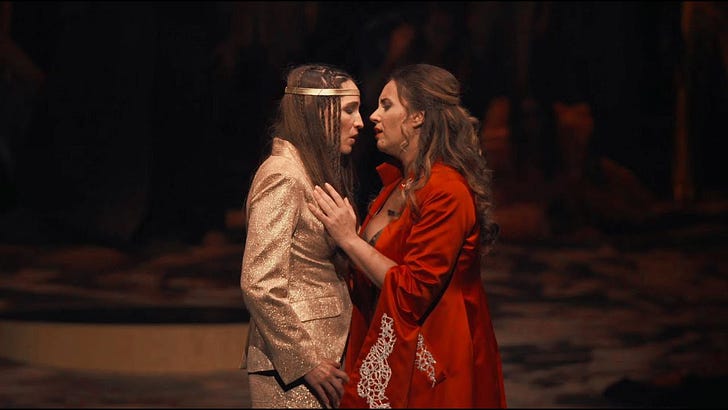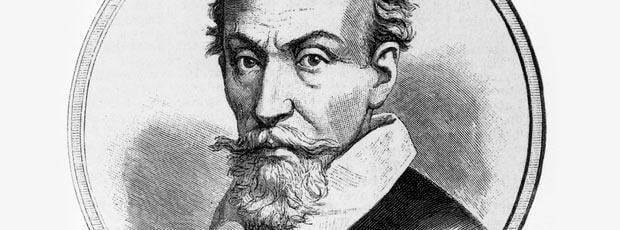Monteverdi’s operatic language wanted to fully express the feelings of human beings. Monteverdi believed that music should make people cry, not discuss. That music should not follow rigid rules, but should give space to the human condition and express it.
One of the most sensational consequences were Monteverdi’s dissonances.
Today we’re listening to…
“Pur ti miro, pur ti godo” (“I gaze upon you, I desire you”), the final love duet between Nero and Poppea in Claudio Monteverdi’s L’incoronazione di Poppea (The Coronation of Poppea). The first performance of Poppea was in Venice in 1643, and it is the masterpiece of the early baroque period and his best-known opera. Monteverdi deserves the credit for having co-founded the art form of opera.
This duet is one of the most intimate and beautiful moments in all of opera (although there are opinions that claim that this duet was composed by someone else). When done well, the audience feels like a voyeur as it can get pretty steamy🔥
📺 Watch and listen here (5 minute listen), Claudio Monteverdi, L'incoronazione di Poppea, “Pur ti miro, pur ti godo”, live recording at Salzburg Festival 2018, Sonya Yoncheva (Poppea), Kate Lindsey (Nerone), Les Arts Florissants, led by William Christie, Jan Lauwers, stage director and choreography
The text is direct and straightforward:
I adore you, I embrace you,
I desire you, I enchain you,
no more grieving, no more sorrow,
O my dearest, O my beloved.I am yours, O my love,
tell me so, you are mine,
mine alone, O my love.
Feel my heart, see my love, see.
The roles of Nerone and Poppea are both sopranos in this production we are highlighting here, but Nerone is normally sung by a countertenor (historically a castrato) but sometimes performed by a soprano or mezzo-soprano or even by a tenor. Once you’ve heard it performed by a good countertenor, though, it’s hard to listen to it any other way.
The opera is in three acts, all set in ancient Rome, in 65 A.D. The main characters are Nero, the Roman emperor; Poppea, his lover; Otho, Poppea’s fiancé; Drusilla, who is in love with Otho; and Octavia, Nero’s wife.
Poppea has caught the eye of the emperor Nerone (Nero), and he has fallen in love with her. He believes his wife, Ottavia, cannot have children, and he prefers the openness and affection that he gets from Poppea as opposed to the coldness he says he feels from his wife. He decides he wants to make Poppea his wife (and the empress of Rome).
To complicate things, Poppea had a lover before Nerone, Ottone (Otho), who has been away for several years, but who returns to find himself replaced by the emperor. Otho pleads with Poppea to remember their love, but her desire to become queen is far too strong. Ottone tries to forget her, even starting a relationship with Drusilla instead. However, when Ottavia gives Ottone the order to kill her husband’s lover, Ottone cannot go through with it. No matter how much it hurts, he still loves her, but is exiled by the emperor. Ottavia’s crime is also discovered, and she is forced to leave the kingdom.
In this final duet, Poppea is crowned empress.
Here are some other interpretations of the piece (where you will also notice some more modern styling in some):
WATCH & LISTEN Sonya Yoncheva (Poppea), Max Emanuel Cencic (Nero), Monteverdi’s L'Incoronazione di Poppea “Pur ti miro, pur ti godo” [**HIGHLY RECOMMEND**]
WATCH & LISTEN Danielle De Niese (Poppea), Philippe Jaroussky (Nero), Monteverdi’s L'incoronazione di Poppea “Pur ti miro, pur ti godo”
LISTEN Danielle Borst (Poppea), Guillemette Laurens (Nero), Monteverdi’s L'incoronazione di Poppea “Pur ti miro, pur ti godo”, Concerto Vocale, René Jacobs, conductor,
Have questions about this opera or this post? Drop your questions in the comments, and we will share more!
Thank you for reading (and listening),
Michele
❤️ If you enjoyed this selection, hit the heart to like it. It helps others find Opera Daily.





The NYC Opera did a notable POPPEA. But the Baroque Opera productions by Nicholas Harnoncourt did a great recorded series of much of Monteverdi. LaScala tried a version of Vivaldi's TITO MANLIO that was a hard slog in Milan. It has taken many years to more fully understand how to restage these works, both with profound success and failure along the way.
Much of Baroque Opera to me sounds like little more than organized grunting. The big exception is the final duet from Monteverdi's (not to be confused with the Verdi of centuries later!) "The Coronation of Poppea." This version, with one of the singers in a trouser role, is magnificent!